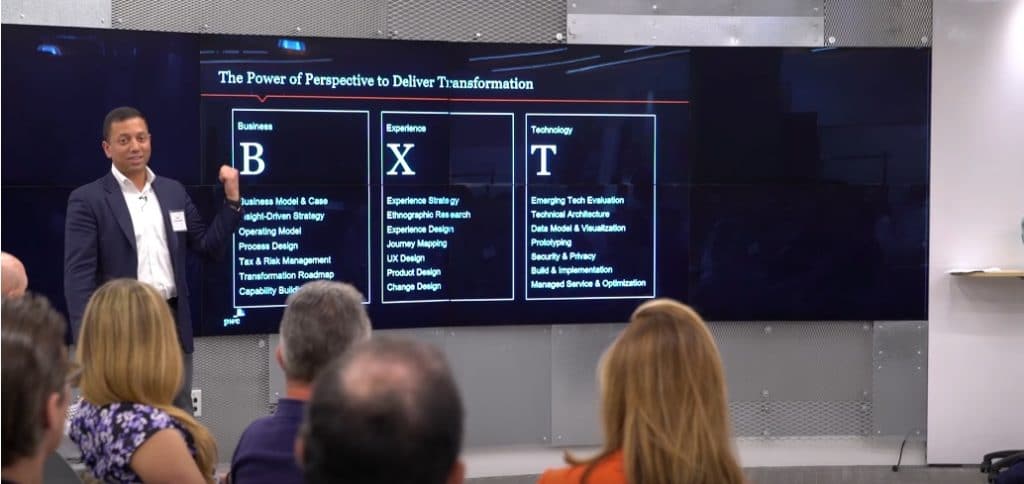Last year, consultant-led agencies first led the annual Advertising Age listing of the top digital agencies, leading to a lot of discussion about the pros and cons of different kinds of marketing agency structures. At consultancy PwC the debate is over; it ranked third in the Ad Age rankings by revenue.
The consultants have a strategic advantage over marketing agencies, says Tom Puthiyamadam, Global Leader of PwC’s Digital Services practice. The unit helps business grow by adopting digital-first strategies, which increasingly includes digital marketing and experience design. In recent years, PwC has acquired the marketing and design agencies Fluid and Pond and expanded its services deeper into the marketing space.
Puthiyamadam spoke to Velocitize about connecting the digital dots, why CMOs won’t take on digital transformation and why it is important to work your way backwards into technology.
Velocitize: You’ve spoken before about how companies fail at digital transformation because they think “technology-forward” instead of “experience-backwards.” Can you explain?
What we’re doing today is just throwing technology out there to the community—to your employees in finance and your employees in the marketing organization—and saying: “Go use it. Hopefully make something good happen.”
(That’s done) rather than ask: “What’s this employee trying to get done? What’s this consumer trying to get done?” Work your way backwards, if you will.
Consultants like PwC have committed to building digital marketing organizations. How is that better for a marketer than using an agency?
Our clients today are struggling to connect the dots. I think you get the best of both worlds. PwC and all of our competitors, every one, are hiring tremendous creative talents.
Up to this point, marketers have blamed consultants and each management consultant blamed the agencies. But what if you put them all in the same team and said: “We’re all here to drive the growth of this company, full stop?”
That means a better brand, a better creative, a better campaign, a better commerce experience and better fulfillment. If you’re an executive, who wouldn’t sign up for that?
The teams that have the holistic capabilities are the ones that can be accountable. They’re the ones that say: “I’m trying to drive growth. Don’t point fingers at each other. Marketing, product development, supply chains and sales and service: you guys have to work together. If you guys are pointing fingers at each other, I don’t get my result, and I’m accountable to shareholders.” That’s a very different story than everybody else in the room.
Can you share an example where that relationship has led to innovations?
We had a very large office supply retailer who has to compete with some of the online giants out there. They came to us and said: “We want a better e-commerce experience.”
Our perspective was: your customers have actually evolved into small and medium businesses. They’re taking up a larger share of your customer base. What if we thought of a better product you could offer them that leverages digital technologies, but answers their critical need and uses an asset that you already have? They owned a lot of retail storefronts, and most retailers can’t get out of those leases.
We want to offer every small and medium business the ability to offload all their administrative activities: accounting, HR, office supplies. We’re going to offer that as a singular solution as an outsourced service, and we can use your real estate to support those small and medium businesses. Instead of competing with this online giant that is out there, you have this service platform others can’t compete with.
That in my mind is the game that we play as consultants: When you think strategy and you think about the markets, how they move, and what’s going to be differentiating.
How has the relationship between agencies and marketers changed as more players become involved? Is everyone in everyone’s business now?
We have not seen our consulting businesses impacted by anyone other than other consultants. The digital agency game has been impacted by a few entrants like Deloitte, PwC, (and) Accenture. I think that’s where the turf war is happening.
Very few CMOS are driving the transformation agenda. That’s why most CEOs have brought on chief digital officers (and) chief transformation officers, to think about digital transformation in its broadest context.
If they’re going to start innovation from the consumer viewpoint, shouldn’t CMOs be driving that?
They have full right to go do it, but I don’t think we’ve seen a lot of traction from that population in saying “We have to redefine our role and be something more critical.”
The reality is that population is not as digitally equipped as it should be to take on that responsibility. That’s why so many CEOs continue to hire in these additions to the C-suite.
Does the shiny-object syndrome persist?
Everybody is experiencing it and we all know why they’re doing it. They feel it’s a short-term fix. But we have to go beyond the short-term fix.
We’re very accountable to our clients for business results, first and foremost. We try to cut through the shiny-object effect and ask what we’re really trying to do. What are you really trying to accomplish? Are you trying to keep market share? Are you trying to take cost out of your business?
Let me find that business goal and we’ll find which new emerging technology, what great experience we can create for your employees and your customers that can actually achieve that goal. We won’t be reckless and just try to invent technologies for technology’s sake.
